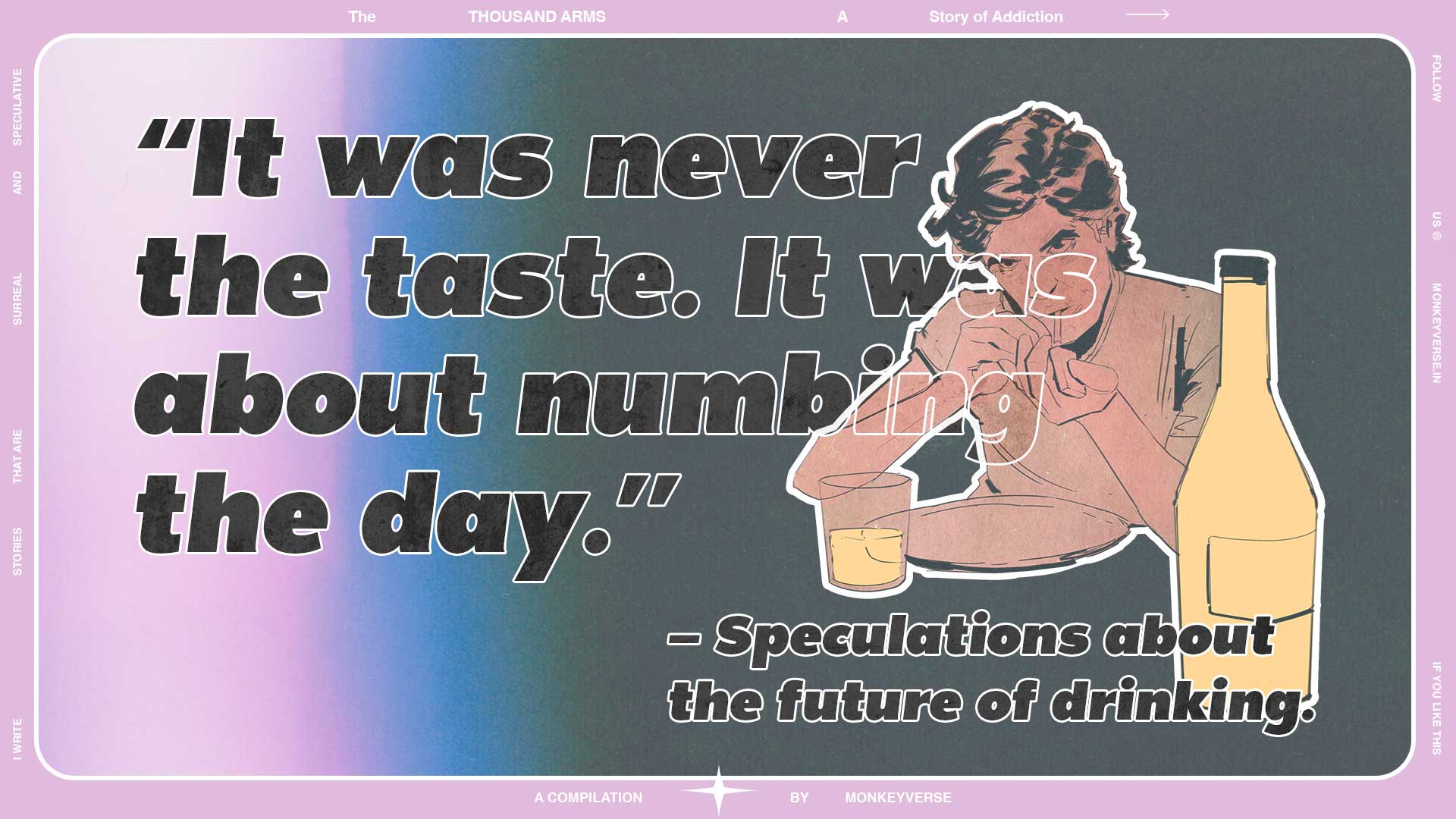
Worldbuilding with Speculative Policies
A hearty hello.
When I started tracing the outlines of alcohol policies in India I anticipated it to be more of a ‘governance’ problem; Numbers, laws, state excise acts, maybe a few case studies.
Oh! How wrong was I!
It is not just a bottle-on-the-table type of problem; it happens to be a mirror of the contradictions that we live in; stitched deep into our rituals; weddings where glasses are raised, funerals where silence is drowned, evenings in small towns where home-brew is shared without a thought for legality. I remember a wine store on a dry day in Delhi some years ago, with men outside no less intoxicated.
And so the question is what does the world of The Thousand Arms look like?
It is tragic that Satori, the character whose world I’ve been sketching, began drinking far too early in life, and found alcohol available at every corner without pause or question. But now I have started asking myself — what if the governance in this world could be different? What if, instead of treating alcohol purely as a source of revenue or prohibition, we built systems that actually tried to reduce harm and heal dependency?
Could there be ministries and councils that think about prevention, recovery, culture, and intergenerational wellbeing, not just taxation? These speculations, are born out of both, research and imagination, and are an initiation of a map of the world — a blueprint for a more humane and integrated response to alcohol-related harms.
Ministry of Psycho-Social Health & Dependency Recovery (MoPHDR)
A new central ministry that focuses not only on addiction but on the social and psychological roots of dependency — including alcohol, gambling, digital addiction, and pharmaceutical abuse. The ministry brings together psychiatrists, anthropologists, artists, and local community workers to design recovery ecosystems, not just clinics.
—
Local Panchayat-led Harm Reduction Councils
Each village or ward-level panchayat runs a harm reduction council made up of local residents, peer counsellors, youth leaders, and one state liaison officer. They monitor home-brew practices, track underage access, and coordinate non-policing responses to addiction — like employment support and family mediation.
—
Excise Revenue Redistribution Board
A transparent, citizen-auditable body that redirects alcohol excise revenue into health and educational funds. Every bottle sold contributes a micro-tax, visible on the receipt, which feeds into a public dashboard. Citizens can vote on local allocation — mental health services, de-addiction clinics, or harm reduction campaigns.
—
National Registry of Alcohol-Linked Health Outcomes (NRAHO)
A public health data system that anonymously tracks alcohol-related hospitalizations, liver diseases, domestic violence complaints, and workplace injuries. Allows for real-time mapping of alcohol harm hotspots, so interventions can be hyper-localized and proactive rather than reactive.
—
Public Interest Alcohol Design Lab (PIAD-Lab)
A government-supported innovation lab where designers, behavioural economists, and media workers collaborate on campaigns, packaging reforms, alternative social rituals, and new forms of non-alcoholic hospitality that de-normalize alcohol without demonizing users.
—
Algorithmic Wellness Regulation Authority (AWRA)
A tech regulatory body that monitors how alcohol is promoted online — through influencers, platform algorithms, surrogate marketing, and AI-generated content. Think of it as the Tobacco Board for the digital era — flagging harmful content and redirecting youth attention toward safer narratives.
—
Department of Future Generations
A constitutional office that advocates for policies affecting unborn generations. In alcohol policy, this department intervenes on prenatal exposure, youth marketing, long-term public health planning, and intergenerational trauma linked to alcohol abuse.
—
Rehabilitation Through Work (RTW) Urban Missions
Every major city has an RTW office that partners with small businesses, municipalities, and cooperatives to offer structured part-time employment to recovering users—especially those released from detox or rehab centres. This creates economic dignity alongside sobriety.
—
The School of Conscious Consumption
A public education project integrated into the CBSE/State Board curriculum from Class 6 onward. Teaches students about alcohol, media influence, stress coping, impulse control, and pleasure without dependency. Includes parent modules and local storytelling formats to keep it culturally rooted.
—
Annual National Report on Alcohol Harm (with Citizen Contributions)
An open-source report issued every year by a coalition of ministries, researchers, NGOs, and recovered users. Includes ground reports, case studies, poetry, medical data, and regional updates. Helps shift the conversation from numbers to narratives, and invites public ownership of the problem.
—
These speculative departments and councils could become the beginnings of a culture shift. A country where the government and its foresight approaches alcohol with empathy, foresight, and creativity. A place where the community, not just the police or the state, has a say in how harm is reduced.
Of course, these are speculative futures. But unless we can picture better systems, we will always remain trapped in the contradictions of the current ones.
—
Breathe 🙂
Yuvraj Jha.
Concept Artist. Worldbuilder. Storyteller.
Insta – @monkeyverse | Youtube – @monkeyverse_in
Shop – bandarchaap.com | Insta – @bandar.chhaap
3 Comments
Comments are closed.

Pingback: Studio F-ARTs from August – Monkeyverse